All That Heaven Allows (1955)
“Don’t you see I’d be turning my back on everything I’ve ever known?”
|
Synopsis: |
|
Genres, Themes, Actors, and Directors:
Review: Wyman and Hudson’s romance in ATHA is never exactly believable; while we can understand why Wyman — a lonely widow — would go gaga over hunky Hudson, the opposite motivation simply isn’t there. We never get a sense of why, exactly, the free-spirited Hudson (who has no desire at all to tap into either Wyman’s money or social set) feels Wyman is suitable as his new soulmate. Such quibbles must ultimately be set aside, however, given that this is squarely meant to be a women’s picture — a film designed precisely to appeal to those [females] who could relate to Wyman’s predicament (as a lonely housewife and mother) in some form or another. Hudson’s character suits Wyman’s needs perfectly, and thus — he exists. Meanwhile, the competing forces in Wyman’s life — ranging from her claustrophobically judgmental social circle, to her priggish grown children — are over-the-top yet believable at their core. What really makes this and other key Sirk films so memorable, however, is their unique, consistently stunning visual style. Vibrant colors are used to strategic effect here to convey characters’ increasingly intense emotions, with nearly every shot perfectly designed and framed to convey a certain sensibility. Check out the bottom still below, for instance, in which Wyman’s face is highlighted in the screen of the television set her children have purchased for her as a “companion” — she’s surrounded on either side by the salesmen who have eagerly set it up for her, but her forlorn expression is undeniable. Much schmaltzier are the images framing Wyman’s final encounters with Hudson (that deer!), which definitely shift the film into high melodrama — but by this point we’re invested enough in Wyman’s happiness that we simply accept what Sirk offers up to us, schmaltz and all. Redeeming Qualities and Moments:
Must See? Categories
(Listed in 1001 Movies You Must See Before You Die) Links: |
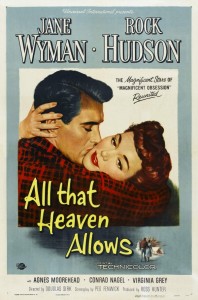

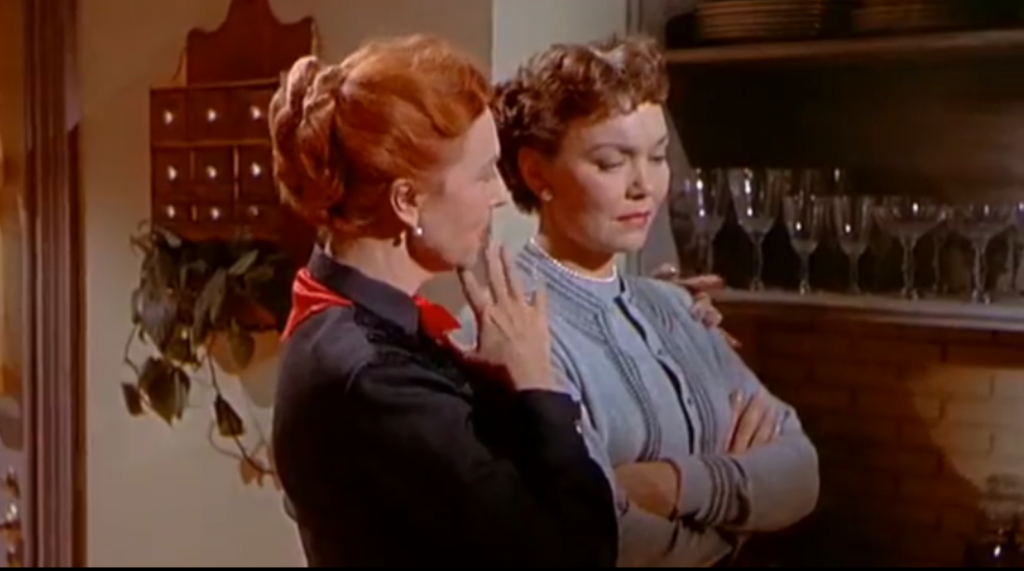
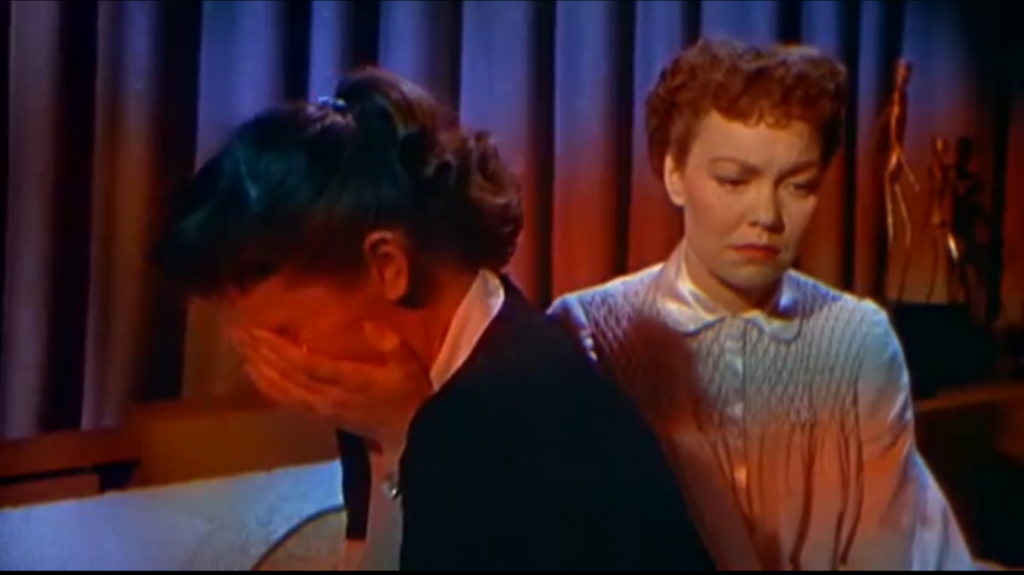
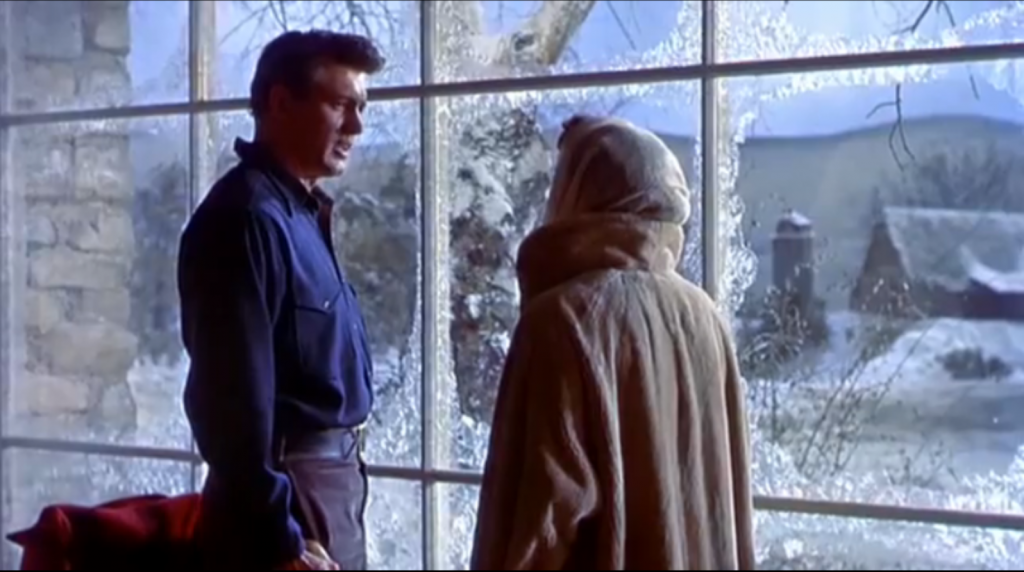
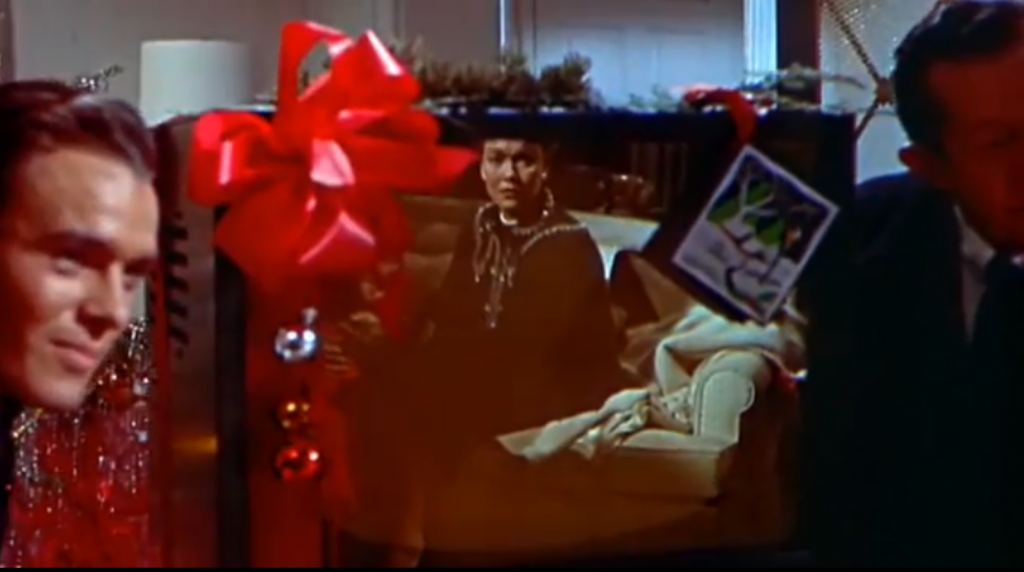
One thought on “All That Heaven Allows (1955)”
A once-must, for its place in cinema history. (And it’s easier to take than ‘Magnificent Obsession’.)
I’m still not all that crazy about it personally – but I’m only in the target audience because ‘ATHA’ is, in part, a film about small-mindedness as well as the need to rely on yourself (and not society) when deciding how you will shape your life. That’s stuff that’s aimed at general viewers.
But, of course, the film, first and foremost, is pure – and often very silly – soap opera. Is it unbelievable as soap opera? No. The sad thing is that people really do (still) say a lot of the silly things that are given voice here.
By calling the film “fake and honest”, DVD Savant is on to the film’s duality. It actually has serious content on its mind – but it’s mixed in with a fair amount of the mundane. The duality continues in the way the progressive characters are pitted against those who are clinging to what feminism has rendered laughable. Even the closest male friend of Ron (Hudson) is not as enlightened as he might like to think: “She doesn’t want to make up her mind. No girl does. She wants you to make it up for her.”
Of course – as with ‘Magnificent Obsession’ – gay audiences can have a field day with this movie. Not only because it stars Rock Hudson (considering what we all have known about Hudson for a long time now, the film takes a decided slant away from hetero territory), but because of a good deal of the dialogue. Among the highlights in that regard: Reynolds to Wyman: “I think all you see is a good-looking set of muscles.”; Wyman to Hudson: “And you want *me* to be a man.”; just about everything Jacqueline de Wit says as the anything-but-subtle gossip Mona.
Sirk is to be applauded for keeping such tricky material from becoming a howl-fest. That was not an easy task. The film begins with treacly theme music by Frank Skinner. When that ends, we almost expect a narrator to jump in with, “This is the story of a woman…not an ordinary woman…but a woman with needs…strong, strange needs…”. But Sirk takes his theme of passion very seriously. ~which is why he lingers on Wyman’s genuinely puzzled face when the man closer to her age tells her that “companionship and affection are the important things.”
It’s not the performances that make or save the film, but Sirk’s guiding hand.
Nevertheless, some of the film remains too forced: the ‘symbolism’ of the broken Wedgwood; the need for a near-tragedy in the penultimate scene…probably etc.
But…still, ‘ATHA’ was inspiring for me personally. The film’s trailer is what I ended up using for the start of my one-act play, ‘My Night with Rock Hudson’.